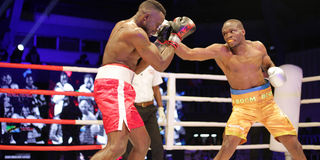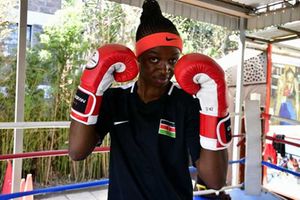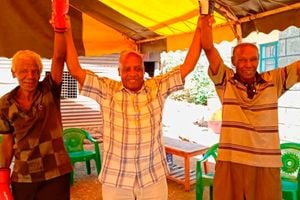Breaking News: Former Lugari MP Cyrus Jirongo dies in a road crash

Kenya's Rayton Okwiri (right) lands a right on Malawi's Chikodi Makwa during their Waba Supreme Africa Middleweight title at the Nyayo National Stadium on September 9, 2023.
Rayton Okwiri looks at his collection of medals and title belts with deep reflection. His boxing journey has been rewarding as it has been challenging.
On an enviable eight-year unbeaten run in domestic competitions, highlighted by captaining the Kenyan squad to the 2016 Rio de Janeiro Olympic Games, the middleweight boxer is distraught by the turn of events in Kenya’s Olympic boxing.
In Rio, Okwiri was accompanied by bantamweight Benson Gicharu and lightflyweight Peter Mungai. The trio failed to make the quarter-finals as Mungai and Okwiri fell in the Round of 16 to China’s Lu Bin and Morocco’s Mohammed Rabii, respectively, while Gicharu was eliminated by Mongolia’s Erdenebatyn Tsendbaatar in the round of 32.
Kenya fielded two men (featherweight Nick Okoth and heavyweight Elly Ajowi) and as many women (flyweight Christine Ongare and welterweight Elizabeth Akinyi) in the delayed Tokyo 2020 Olympics, with all boxers failing to go past the round of 16.
This year’s Paris Games turned out to be Kenya’s worst nightmare in years as, for the first time in 20 years, the once dreaded “Hit Squad” failed to land a boxer at the Olympics which attracted 249 boxers (125 men and 124 women) in 13 different weight categories at the North Paris Arena and Roland-Garros Stadium.
Meanwhile, internationally, the supremacy fight for the sport’s management between World Boxing, International Boxing Association (IBA) and the International Olympic Committee (IOC) intensified unabated, with the IOC again taking charge of the Olympic qualification tournaments.
This against the backdrop of threats by the Olympics body that boxing could be excluded from the 2028 Los Angeles Olympics over these governance issues coupled with allegations of lack of financial transparency and fixing of bouts.
Kenya sprung into international boxing prominence when Ali Juma won a silver medal in the featherweight competition at the 1962 Commonwealth Games in Perth, Australia, before Philip Waruinge bagged his first major title in Congo Brazzaville, and two featherweight titles at successive Commonwealth Games.
After bagging a bronze medal in the Mexico Olympics in 1968, Waruinge was awarded the “Val Barker Trophy” as the most stylish boxer of the tournament.
To date, Kenya’s greatest moment at the Olympic Games, away from the traditional athletics staple was at the 1988 Seoul Games when a young truck driver at Kenya Breweries Limited – Robert Wangila – struck Kenya’s, and Africa’s, first ever Olympic gold medal in the boxing ring.
The Busia-born welterweight boxer was then to join the lucrative professional ranks under promoter Akbar Muhammad of Top Rank Inc. before he met his death in Last Vegas, Nevada, USA, from injuries sustained in the ring in July, 1994.
The trailblazer was on life support with a blood clot on the right side of his brain after being stopped in the ninth round of his bout against Houston-based Mexican David Gonzalez.
At the 1988 Seoul Olympics, Kenya’s “Hit Squad” also featured Stephen Mwema (bantamweight), Joseph Akhasamba (light heavyweight), John “Duran” Wanjau (featherweight), David “DK” Kamau (light welterweight), Daniel Mwangi (flyweight) and Christopher “Bingwa” Sande (middleweight). Besides Wangila’s gold, Sande also bagged a medal, a bronze, after losing to Germany’s champion Henry Maske 5-0 on points in the semi-finals.
Wangila’s gold and Sande’s bronze in Seoul turned out to be the last Kenyan Olympic boxing medals to date, and, with no Kenyan boxers having qualified for the Paris Games, an extremely difficult act to follow.
“It’s the blind leading the blind,” Okwiri sums up Kenya’s current amateur boxing scene, arguing that while the current Boxing Federation of Kenya, headed by Anthony “Jamal” Ombok means well for the sport through the ambitious “Ndondi Mashinani” programme, lack of technical depth has cost the Kenyan game dearly.
“Granted, boxing has spread across the country - and credit to Jamal and his team - but the quality is not good enough,” Okwiri argues.
“The federation should have hired a foreign coach to train the local coaches who can then go out countrywide and launch the training programmes. At the moment, it’s novices training novices.”
However, Kenya’s bright moment for 2024 was the ray of hope provided by the “Hit Squad” finishing third overall behind Morocco and the Democratic Republic of Congo at the Africa Boxing Championships in Kinshasa last October.
Kenya panned one gold, two silver and five bronze medals, breaking a seven-year stalemate since lightweight Nick Okoth bagged gold at the 2017 edition of the continental showcase in Congo Brazzaville.
Boniface Mogunde outlasted Burundi’s Nduwarugira Nesta to clinch the gold with the silver medallists being light heavyweight Elizabeth Andiego and super heavyweight Clinton Macharia and bronze coming through Abednego Kyalo (flyweight), Shaffi Bakari (bantamweight), Amina Martha (bantamweight), Alloice Vincent (welterweight) and Robert Okaka (heavyweight).
And while he regrets Kenya’s failure to place a boxer on the Paris ring, Boxing Federation of Kenya Secretary General David Munuhe sees light at the end of the tunnel.
“Yes, we didn’t land a boxer in Paris, but people fail to look at the dynamics,” Munuhe, also a veteran coach maintains, also referring to a controversial Olympic qualification quota system that saw Kenya fail to progress from all the qualifying tournaments. But he is confident that capacity-building programmes undertaken by the federation will bear fruit.
“Finishing third at the African championships for the first time since 1983 was a great performance and no mean achievement. We believe in 2025 things will be much better,” he told Nation Sport.
“We held an international coaching course here in Kenya and also courses for referee and judges. Seven referees and judges earned international certification at a course in Tanzania and some of these followed up shortly afterwards with elevated certification in Nairobi.
“We are also building a youthful team of boxers and with a heavy calendar in 2025, we are confident they will perform well and keep improving,” Munuhe adds.
Meanwhile on the global scene, IBA celebrated the “IBA Unity Day” on December 12 to mark four years since the federation’s firebrand president Umar Kremlev took charge. IBA prides itself in having organised eight World Championships and 30 “Champions Night” fight nights alongside continental and local tournaments.
The international body also lists some of its milestones under Kremlev as including governance reforms, support for boxers, empowering national federations and running various development programmes. For the last couple of years, the IBA and rival World Boxing have been fighting for recognition at the IOC as bona fide administrators of the Olympic sport.
In June last year, the IOC stripped the IBA of recognition for allegedly failing to complete reforms on governance, financial and ethical issues.
The IBA has appealed against the decision at Lausanne-based Court of Arbitration for Sport (CAS) as a number of countries opposed to Kremlev’s IBA moved to form a rival organisation – World Boxing.
The United States of America, Switzerland and Great Britain are among IOC member federations backing the World Boxing spliter organisation.
CAS had earlier on rejected a bid by IBA to block IOC’s decision to strip its recognition, hence the ongoing case.
Boxing, a key sport at the Olympic Games, is now being overseen by the IOC and it is against the backdrop of the incessant management wrangles that the IOC has made the unpopular proposal to exclude boxing from the Los Angeles 2028 Olympic programme.









